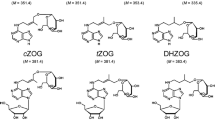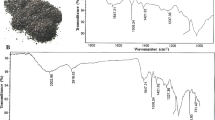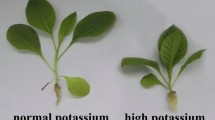Abstract
THE phosphorylated compounds in leaves of Thatcher wheat plants have been studied after supplying radioactive orthophosphate (phosphorus-32). After killing, extraction of the leaves with boiling alcohol, and evaporation of the extracts to small volume, aliquots were fractionated according to the procedure of Runeckles and Krotkov1, involving ionophoresis and paper chromatography. In addition to several of the commonly occurring phosphate esters, several radioactive unknowns were detected on subsequent autoradiograms. This communication deals with the identification of two of these compounds.
This is a preview of subscription content, access via your institution
Access options
Subscribe to this journal
Receive 51 print issues and online access
$199.00 per year
only $3.90 per issue
Buy this article
- Purchase on Springer Link
- Instant access to full article PDF
Prices may be subject to local taxes which are calculated during checkout
Similar content being viewed by others
References
Runeckles, V. C., and Krotkov, G., Arch. Biochem. Biophys., 70, 442 (1957).
Barnard, P. W. C., Bunton, C. A., Llewellyn, D. R., Oldham, K. G., Silver, B. L., and Vernon, C. A., Chem. and Indust., 760 (1955).
Szulmajster, J., Grunberg-Manago, M., and Aubel, E., Bull. Soc. Chim. Biol., 35, 455 (1953).
Author information
Authors and Affiliations
Rights and permissions
About this article
Cite this article
RUNECKLES, V. Formation of Alkyl Phosphates in Wheat Leaves. Nature 181, 1470–1471 (1958). https://doi.org/10.1038/1811470a0
Issue Date:
DOI: https://doi.org/10.1038/1811470a0
Comments
By submitting a comment you agree to abide by our Terms and Community Guidelines. If you find something abusive or that does not comply with our terms or guidelines please flag it as inappropriate.



